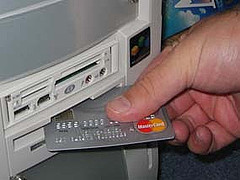Mortar Crumbs to E-commerce Clicks
 This series of posts about Ecommerce is brought to you in conjunction with Vodafone, who are currently recruiting a Head of Ecommerce, see Chinwag Jobs for more information.
This series of posts about Ecommerce is brought to you in conjunction with Vodafone, who are currently recruiting a Head of Ecommerce, see Chinwag Jobs for more information.
It's an interesting time for e-commerce, certainly challenging, but there are potentially even bigger things afoot. Away from the on-line world, the last few months have seen numerous collapses in the high street.
 Pick-n-mix legend Woolworths closed its doors. Music and games retailer Zavvi pulled down their shutters, and the fashion retailer Principles closed its doors too. That isn't the end of the tale though.
Pick-n-mix legend Woolworths closed its doors. Music and games retailer Zavvi pulled down their shutters, and the fashion retailer Principles closed its doors too. That isn't the end of the tale though.
Woolworths is back, but on-line. The Woolies website site redirects to a blog which promises they'll be "Back soon" on-line. The Zavvi name has been purchased and resurrected, with an on-line store announced this week. Principles was partially saved too, purchased by Debenhams. Note that Debenhams picked up the stock, not the physical stores.
None of this should be a surprise. What we are seeing is not the beginning of the end, it is the end of the end for shops-in-mortar. With the arrival of the big on-line merchants, high street retailing passed its best before date long ago. In some ways it is more surprising that it has stood up for so long. Giants like Amazon don't appear on a scene without causing huge disruption.
To old hands, it might feel like the transition has been going on for decades, but this may be only just the beginning of the transition. Even in the face of the current economic climate, growth in e-commerce continues.
"Growth will come from online buyers who shift a greater share of their discretionary spending from stores to the Web. Consumer demand, especially among affluent online shoppers, will provide an additional sales boost." eMarketer
While figures in the US might be down, here in Europe it is a different story. The French are filling their shopping carts like never before. According to a recent study on French e-commerce, they grew online sales by 29% in 2008, to 20 billion Euros. That's slower growth, but still none too shabby. More broadly in Europe the e-commerce market was estimated to be worth over 100 billion Euros, even back in in 2006 , with 70% of that money concentrated in just 3 markets: Germany, France and here in the UK.
The current downturn is likely to accelerate the growth of e-commerce in the longer term, even if the short term ride might be a bit bumpy. The market dynamics favour e-commerce as a more efficient and effective way of doing business. It allows for very targeted, dynamic promotions, based on high quality customer data. People might not be hitting the high street, but it seems they are still hitting the web.
What happens when we come out of the downturn remains to be seen, but e-commerce sites are in an excellent position to pick up business fast. If traditional retailers get to rebuild their high street presence, it will be a slow and expensive process. Opening physical stores doesn't come easy or cheap. That leaves on-line rivals free to take the higher margin rich pickings.
[Pic courtesy of garethjmsaunders]


